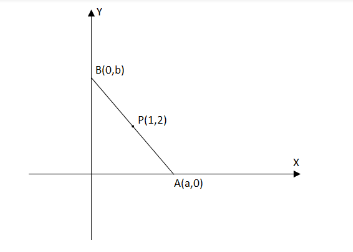Question
Question: Let L be the line passing through the points P (1, 2) such that its intercepted segment between the ...
Let L be the line passing through the points P (1, 2) such that its intercepted segment between the coordinates axes is bisected at P. If L1 is the line perpendicular to L and passing through the point (-2, 1), then the point of intersection of L and L1 is:
A. (54,512)
B. (2011,1029)
C. (103,517)
D. (53,1023)
Solution
Hint : We have the equation of line passing through point we have (x0,y0) and slope m is y−y0=m(x−x0) . We also know the equation of intercept is ax+by=1 . Now we need to find (x,y) . We first find the values of ‘a’ and ‘b’ by the condition of the intercepted segment. We also know that if two lines are perpendicular then the product of their slope is -1.
Complete step-by-step answer :
Let the equation of line of intercept is
ax+by=1
Line cut X-axis at A(a,0) and Y-axis at B(0.b) .

Since the intercept segment between the axes is bisected at P. So coordinate of P are P(2a,2b) .
But coordinates of P are given, P(1,2) .
Comparing these two and equating ‘X’ and ‘Y’ coordinates we have:
⇒2a=1 and ⇒2b=2 .
⇒a=2 and ⇒b=4 .
Now, equation of line is given by,
⇒2x+4y=1
Taking L.C.M. we have,
⇒42x+y=1
⇒2x+y=4 - - - - - (1)
Rearranging we have, y=−2x+4
Comparing this with y=mx+c we have, m=−2 .
Since L1 is perpendicular to L.
Slope of line ⇒L1=21 .
Equation of L1=21 passing through (-2, 1) is
⇒y−1=21(x+2)
⇒y−1=2x+1
Taking L.C.M. we have,
⇒(y−1)=2x+2
Multiply by 2 on both sides we have,
⇒2(y−1)=x+2
⇒2y−2=x+2
⇒2y−x=4 - - - - - (2)
Now solving equation (1) and (2), we will get the intercept points.
From (2) we have x=2y−4 - - - - (3) and substituting in equation (1) we have,
⇒2(2y−4)+y=4
⇒4y−8+y=4
⇒5y=4+8
⇒5y=12
⇒y=512.
Now substituting ‘y’ in equation (3) we have,
⇒x=2(512)−4
⇒x=524−4
Taking 5 as L.C.M.
⇒x=524−20
⇒x=54 .
Thus we have the point of intersection of L and L1 is (54,512) .
So, the correct answer is “Option A”.
Note : Remember the equation of intercepts of equations. We also know if two equations are perpendicular then their product of slopes is -1, that is m1×m2=−1 . Using this we found the slope of L1 . Which is perpendicular to L. We have solved the above two equations by substituting. We can also solve this by elimination and cross product method.
